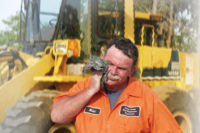“You would be too, Joe — working in this heat all day. I don’t know if I can take it anymore!â€
Joe was more than concerned. He knew that Willie wasn’t normally so irritable and it was just one sign that Willie’s body could be nearing heat exhaustion.
“Take a 15-minute break and get some of that water. I just filled it up — it’s nice and cold. I know some of you guys have a lot of coffee in the morning. That’s not always good, especially in this heat. Caffeine has a way of dehydrating your body instead of keeping the water in. Hydration is the key, Willie.â€
Joe got to thinking about past events and continued with his conversation. “Remember Louie, a couple of summers ago, he started out feeling bad, got a little dizzy and weak and fell off that platform. Fortunately, he barely got a scratch. You gotta pay attention to your body, Willie. I remember a few years ago at my son’s high school football camp, all the news about pro and college athletes falling out — those teams don’t take chances anymore. The coaches and athletes are better educated about this stuff — about the heat.â€
“Oh, no.â€
“What’s wrong, Willie?â€
“Here comes our new nurse, Mary. She’s so over the top — crazy about safety!â€
“I think that’s a good thing, Willie.â€
Both Willie and Joe greeted Mary and talked about the heat. How difficult it was to work through it. Joe encouraged Mary to join in the conversation and talk about the importance of hydration. He asked about the differences between heat exhaustion, heat stress, and heat stroke. Mary gladly obliged.
Signs of trouble
“Heat exhaustion is less serious than heat stress or a heat stroke. Some of the early warning signs of heat exhaustion might be dizziness, faintness or fatigue. You could also have a headache or muscle cramps. Even pale and clammy skin. These are important things to pay attention to because they could lead to heat stress.“Heat stress happens when your body temperature or core temperature rises. So you need to bring it down by getting in the shade or using cold and wet towels on your neck and head, at minimum. Drinking water slowly will also help.
“You probably already know that heat stroke is the most serious condition. This is when your body is really breaking down — hot and flushed skin and no sweating. High body temperature, confusion, rapid heart beat, even loss of consciousness. This is serious stuff that needs to be treated by medical professionals,†said Mary.
“Good stuff,†said Joe. Willie just smiled and shook his head, probably thinking this woman is too zealous for me.
“So what can I do from now on?†Willie asked.
Listen to your body
“Well, you already know half of it — keep hydrated. Take your breaks in the shade or some cool area. And watch what you wear. Stay away from dark colors and wear light colored T-shirts — that black Metallica one isn’t helping you any. I know this is a lot of information, Willie, but too much information is usually better than not enough. Your body will send you the kind of message that requires your attention.â€Mary left the scene. Willie thought about giving her the “safety general†salute but then thought better of it. He and Joe continued their break and discussion.
“You know, Joe, that Mary bugs me sometimes but I think she really knows what she’s talking about. Maybe she’s just trying to take care of us. At first, I was thinking that she was just trying to show off with all she knows.â€
“Yeah, I know what you mean, Willie, but I agree. I think she’s just a helpful kinda person. All this stuff about heat stress and how we can protect ourselves is important. And it has some take-home value with our kids and families.â€
“You got it right, Joe. It could be a long hot summer. I don’t want to miss any of it.â€
